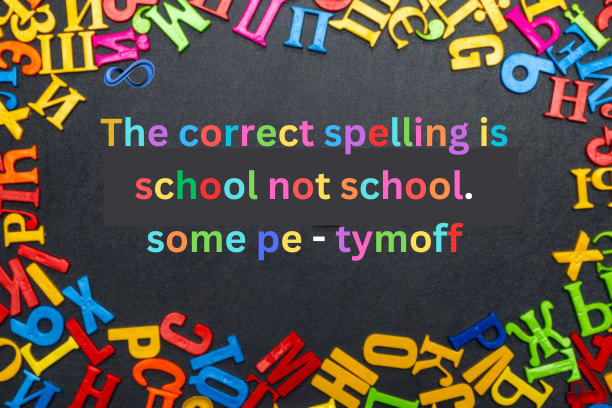Introduction: The Correct Spelling is School Not School. Some Pe
In the world of spelling and grammar, certain mistakes are more common than others. One phrase that might catch your attention is “the correct spelling is school not school. some pe.” While this phrase might seem confusing at first glance, it represents a common issue people face when learning or typing quickly: spelling errors and incomplete sentences. In this blog post, we will explore why correct spelling matters, the common mistakes people make, and how you can improve your spelling skills to avoid such errors.
The Importance of Correct Spelling
Correct spelling is essential for clear communication. When you spell words correctly, you ensure that your message is understood by others without confusion. The phrase “the correct spelling is school not school. some pe“ highlights the confusion that can arise when spelling errors occur. Miscommunication is one of the primary reasons why spelling correctly is so important. Whether you’re writing an email, a school paper, or a text message, spelling mistakes can lead to misunderstandings and may even change the meaning of your message.
Common Spelling Mistakes: Why Do They Happen?
Everyone makes spelling mistakes from time to time, but understanding why these mistakes happen can help you avoid them. The phrase “the correct spelling is school, not school. some pe” is an example of how simple errors can occur, especially when typing quickly or under pressure. Here are some common reasons why spelling mistakes happen:
- Typing Too Fast: When you’re in a hurry, it’s easy to hit the wrong keys or skip letters, leading to spelling errors.
- Auto-Correct Issues: While auto-correct can be helpful, it sometimes changes words incorrectly, resulting in unintended mistakes.
- Homophones: Words that sound the same but have different meanings and spellings, like “there” and “their,” often cause confusion.
- Lack of Familiarity: If you’re unfamiliar with a word, you’re more likely to spell it incorrectly.
- Carelessness: Sometimes, spelling errors happen simply because we don’t pay enough attention to what we’re writing.
The Confusion Behind “School, Not School. Some Pe”
The phrase “the correct spelling is school, not school. some pe” appears to be a mix-up of words and an incomplete thought. It seems to start by correcting a spelling error but then trails off with “some pe,” which likely indicates that the writer was interrupted or made a mistake while typing. This kind of error is common when someone is distracted or trying to type too quickly.
Tips to Improve Your Spelling Skills
Improving your spelling skills can help you avoid confusing phrases like “the correct spelling is school, not school. some pe.” Here are some practical tips to help you spell words correctly:
1. Practice Regularly
Like any other skill, spelling improves with practice. Make it a habit to practice spelling regularly by writing out words, using flashcards, or taking online quizzes. The more you practice, the more familiar you will become with correct spellings.
2. Read Frequently
Reading is one of the best ways to improve your spelling. When you read regularly, you encounter words in context, which helps reinforce their correct spelling. Pay attention to how words are spelled and try to incorporate new words into your vocabulary.
3. Use a Dictionary
Whenever you’re unsure about the spelling of a word, consult a dictionary. Nowadays, online dictionaries and apps make it easy to check spellings quickly. This habit will help you learn and remember correct spellings.
4. Slow Down When Typing
If you often make spelling mistakes because you’re typing too quickly, try slowing down. Taking your time to type each word carefully can help reduce errors and improve the overall quality of your writing.
5. Double-Check Your Work
Before sending an email or submitting a paper, take a moment to double-check your work for spelling errors. This simple step can catch mistakes that you might have missed initially, preventing misunderstandings.
Read more: Shared Joy is a Double Joy; Shared Sorrow is Tymoff: The Power of Connection
Frequently Asked Questions about Spelling Errors
A: The phrase appears to be a mix-up of words and an incomplete thought, possibly due to typing too quickly or being interrupted. It highlights the importance of spelling words correctly to avoid confusion.
A: People make spelling mistakes for various reasons, including typing too quickly, relying on auto-correct, confusion with homophones, unfamiliarity with words, and carelessness.
A: You can improve your spelling by practicing regularly, reading frequently, using a dictionary, slowing down when typing, and double-checking your work for errors.
A: Yes, correct spelling is still important, even in the digital age. It ensures clear communication and helps prevent misunderstandings in both personal and professional contexts.
A: Homophones are words that sound the same but have different meanings and spellings, such as “there” and “their.” They can cause confusion and lead to spelling mistakes if not used correctly.
The Role of Technology in Spelling
In today’s digital age, technology plays a significant role in how we spell and communicate. Tools like spell checkers, auto-correct, and grammar checkers are designed to help us catch spelling errors. However, as the phrase “the correct spelling is school, not school. some pe” suggests, these tools are not foolproof. Auto-correct can sometimes introduce errors, and spell checkers might miss context-based mistakes. Therefore, it’s important to use these tools as aids, not as substitutes for careful proofreading.
Conclusion: the correct spelling is school not school. some pe
In conclusion, the phrase “the correct spelling is school, not school. some pe” serves as a reminder of the importance of correct spelling and the common mistakes that can occur when we’re not careful. By taking the time to improve your spelling skills and paying attention to the details, you can avoid confusing errors and communicate more effectively. Whether you’re writing a casual text or a formal document, correct spelling is essential for conveying your message clearly and professionally. So, remember to slow down, practice, and always double-check your work to ensure you’re spelling words correctly.








